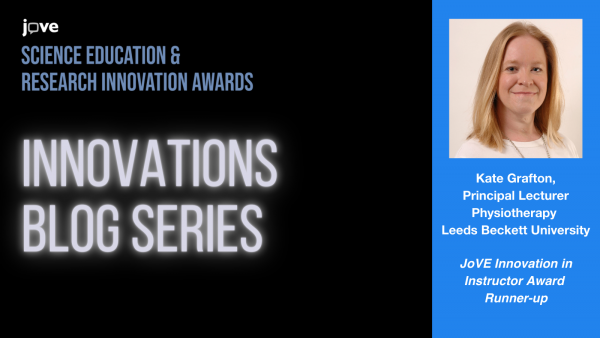The 2021 JoVE Science Education and Research Innovation Awards aimed to recognize and celebrate creative solutions to assist faculty members worldwide in joining the future-focused learning network. This series of blog posts consolidates themes, notes, and resources collated from outstanding entries received from faculty members worldwide. It includes meaningful insights and innovative ideas from a global community of educators, aiming to accelerate the transformation and deepen the impact of science courses. Below you can read the entry by Kate Grafton, Principal Lecturer of Physiotherapy at Leeds Beckett University.
As a healthcare course in the UK during the lockdown periods over the last year due to the COVID 19 pandemic, we could continue practical skills face-to-face teaching for the BSc (Hons) Physiotherapy course, unlike many other HEI delivery. A blended learning approach was adopted with synchronous online tutorials, face-to-face practical sessions and asynchronous directed learning tasks. The choice of playful pedagogy stemmed mainly from a conversation with the students about what they had been doing during lockdown – games featured heavily, which inspired the cardiovascular & respiratory (CVR) physiology team to incorporate three well-known games into the module delivery. Clinical reasoning Cluedo, ‘Shocked’ The Escape Room and Taskmaster-inspired challenges were introduced to physical and virtual classroom environments. We accommodated both staff and student periods of self-isolation, shielding and illness due to COVID through the delivery of this module; tasks and activities had to work for students who could not attend practical sessions in person AND those that could. PPE, social distancing, and all university COVID requirements had to be observed and adhered to. Students were taught in tiny bubbles (groups of 15-20), which meant the module team delivered sessions several times and used video links between practical rooms.
We were inspired and influenced by the work of Whitton & Mosley (2019) and Nicholson & Cable (2021), focusing on playful and puzzle-based learning approaches.
Implementation
Each of the three playful interventions was used in a different pedagogical way to appeal to other learners and to keep engagement and interest in the module content through the challenging winter lockdown period.
Clinical Reasoning Cluedo: In all honesty, this is the author’s favorite childhood board game and immediately came to mind when thinking about a clinical reasoning/revision task to bring all the module content and knowledge together. We often talk about clinical reasoning as problem-solving or like a jigsaw puzzle – putting all the pieces of assessment together to diagnose or decide on a treatment direction. Cludeo combines the same skills: deduction, elimination, and fact assimilation. The biggest hurdle was uploading audio clips from an iPhone to blackboard, but the university digital learning team provided excellent support. Having recently delivered this ‘creative practice’ to LBU’s university-wide DEAP (Developing Excellent Academic Practice) Teaching and Learning conference many of the health course academics have shown an interest.
Shock! An Escape Room
We developed a physical escape room a couple of years ago – utilizing our clinical skills ICU simulation room. The room’s theme is shock/sepsis and includes anatomy, CVR and neurology-based clues to be a revision activity at the end of the module teaching. It has been evaluated well and is the first experience the level 4 students have of being in the simulation suite and using the SimMan. The challenge this year was moving the escape room into an online format and the physical environment. We chose to use google forms based on advice from colleagues in the gaming team, and it was straightforward to transfer the content and puzzles to an (almost) exact online version of our physical room.
Taskmaster
Our students love the Taskmaster TV program (Channel 4 UK television channel), so we decided to incorporate some of the tasks included in the show. Our aim here was to enhance group work in a cohort of first-year students who had barely met each other and to have some playful interludes during very long 3 hour online tutorials on a Wednesday morning.
Evaluation
Practical assessment of the physiology module is taking place as this submission is being undertaken, so we shall have to wait to see any impact on student outcomes. However, student feedback was collected informally, verbally, and through the university standard module evaluation process.
Sarah and I (the CVR physiology module team) were delighted by the feedback –
‘This is the best escape room I have ever done!’
‘Doing these activities made me realize what I didn’t know; it was nice to do it in groups together – not so threatening.’
‘Thank you for making our learning interesting and fun – physiology is a hard subject and we appreciate you trying to make it more accessible.’
‘Kate & Sarah are ace at teaching in a way that is inclusive and interesting – at a time when I had had enough of online – this module made it good again.’
Future Plans
The plan for the Physiology for Physiotherapists module in the next academic year is to continue with the blended learning approach. Feedback from students has been very positive. However, we have yet to see if academic achievement in the practical examination reflects the choice of delivery approach.
We don’t yet know the teaching/COVID safe delivery requirements for the new academic year, impacting the module content and delivery. As academics, we enjoyed the playful learning approach very much – the combination of three different delivery styles kept our enthusiasm and the student’s engagement going through a very challenging and constantly changing term. Even if full face-to-face delivery is resumed – the online activities can still be utilized as revision or supporting resources going forwards. Physiology content, thankfully, doesn’t change significantly year to year but how you empower students learning of this challenging and complex subject to enable them to be safe and successful physiotherapists is our gift.
Get in touch here to learn more about how JoVE videos can help you increase student engagement in your classes.

